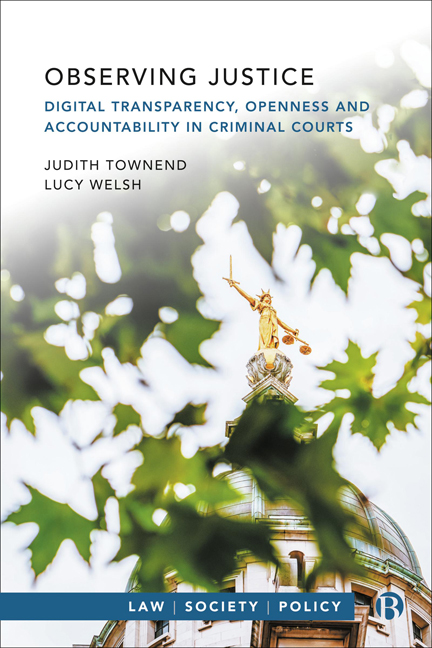Book contents
- Frontmatter
- Contents
- Series Editor’s Preface
- About the Authors
- Acknowledgements
- ONE Introduction: Why We Need to Rethink Approaches to Open Justice in the Criminal Courts
- TWO A History of Accountability in Criminal Courts
- THREE Justice System Modernisation, Digitalisation and Data
- FOUR The Role of the Public and Media in Observing Justice
- FIVE The Human Impact of Justice System Transparency
- SIX Conclusion: Towards a New Framework for Justice System Accountability
- References
- Index
SIX - Conclusion: Towards a New Framework for Justice System Accountability
Published online by Cambridge University Press: 28 March 2024
- Frontmatter
- Contents
- Series Editor’s Preface
- About the Authors
- Acknowledgements
- ONE Introduction: Why We Need to Rethink Approaches to Open Justice in the Criminal Courts
- TWO A History of Accountability in Criminal Courts
- THREE Justice System Modernisation, Digitalisation and Data
- FOUR The Role of the Public and Media in Observing Justice
- FIVE The Human Impact of Justice System Transparency
- SIX Conclusion: Towards a New Framework for Justice System Accountability
- References
- Index
Summary
We opened our book with contrasting perspectives on the impact of court publicity: the first, originally provided by the utilitarian philosopher Jeremy Bentham and subsequently used by judges to powerfully explain the open justice principle; the second provided by a participant in a focus group who had experienced the courts as a criminal defendant. For Bentham, publicity was the ‘soul of justice’; for the former defendant, it was a ‘life sentence’ hindering rehabilitation. The vast disjuncture between the ideal and the reality has been apparent through our research into open justice in practice. Beyond the potentially detrimental impacts on individuals within the system (which some argue is simply the price of transparency), open justice is often not delivered as the courts intend because of insufficient resourcing, piecemeal management, and disparate methods of oversight. We do not – and cannot – attempt to offer an answer to some of the legal and policy questions arising in this short book. We hope, however, that our findings – based on both literature review and empirical socio-legal research – inspire a re-positioning of definitions around open justice and justice system accountability in legal and social policy contexts.
Key findings and argument
In Chapter Two we considered some of the original rationales for open justice in lower criminal courts, arguing that the concept historically fulfilled several functions. Those functions included, but were not limited to, assisting with evidence gathering, publicly shaming and punishing offenders with the aim of both individual and general deterrence as a form of public legal education, and wider democratic accountability in the context of a lower criminal court process grounded in the involvement of local communities. (Lower) criminal courts have, therefore, historically operated with accountability (of both the individual offender and the court process) in mind, although we contend that summary justice is becoming more closed. We argued that taking a broad view of open justice allows us to increase participatory accountability. This would enhance informational transparency and ensure justice system scrutability.
Chapter Three located our discussion about open justice in lower criminal courts’ contemporary use of the Single Justice Procedure (SJP), audio-visual technology and the automatic online conviction process.
- Type
- Chapter
- Information
- Observing JusticeDigital Transparency, Openness and Accountability in Criminal Courts, pp. 120 - 132Publisher: Bristol University PressPrint publication year: 2023

